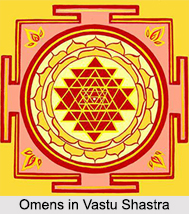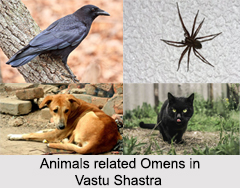 Omen is a sign that precedes an event. Omens can be good or evil, that is, they can foretell a good, positive event or an evil, harmful one. Throughout the ancient world, omens were believed, divined and obeyed.
Omen is a sign that precedes an event. Omens can be good or evil, that is, they can foretell a good, positive event or an evil, harmful one. Throughout the ancient world, omens were believed, divined and obeyed.
Natural phenomena, strange birth defects, or animals acting in unexplainable ways are all commonly seen as Omens in Vastu Shastra. Apart from being related to the animals, several incidents from the day to day life also act as omens, both good and bad.
Good Omens in Vastu Shastra
The Good Omens in Vastu Shastra are as follows:
If a mirror in the house breaks, it means there will be a change of residence for the owner.
If a bangle vendor approaches towards an individual from the opposite direction it is a good omen.
If a funeral procession is coming from the opposite direction it is auspicious.
If the tolling of bells or the sound of an instrument is heard it means the success of the project undertaken.
While walking on the road if a person carrying milk or curd is met it is considered a good omen.
To witness an object or horse coming from the North side is a good omen.
If a couple coming from the opposite direction is seen, it works as a good omen.
If a third person mumbles the number 6, 9, 10, 11, 14, etc. while one is leaving the house and is heard that indicates financial gain and wealth
If persons carrying water pitchers are seen it is very auspicious.
Bad Omens in Vastu Shastra
The Bad Omens in Vastu Shastra are as follows:
If one witnesses a rainbow after sunset the head of the family falls sick.
If a person stumbles and falls while coming out of the house it is a bad omen. He should remove his shoes, sit at home for some time and then go out.
If a funeral procession is going in the same direction it is inauspicious.
In case a person is interrupted while going out and inquired about destination, he or she will have to face failure in the work undertaken.
It is a bad omen while going out for some if somebody suggests that one should take his or her meals and then go.
While coming out of the house if a person is seen coming from the opposite direction scratching his head it is a bad omen. It indicates loss or failure.
If a person carrying firewood or live fire comes across people on the road there are chances of accident or bad health.
If a person mumbles one of the numbers from 1 to 5 or 7 or 8 and is heard by another person it leads to deep trouble.
While coming out of the house if one has to listen to the quarrel of his or her neighbours, it is an omen for failure.
While coming out of the house if a person`s handkerchief, coat, cap or cane falls down there are chances of failure and loss.
While worshipping if the lamp or candle blows off naturally it indicates towards approaching hardships.
Breaking of a pitcher full of water or a lemon indicates hardships.
Cracking of panel and glass of windows is a bad omen.
While coming out of the house if some person pulls at the clothes it foretells failure.
If a marriage procession is crossed by a funeral procession it is very inauspicious.
If a washerman or a woman holding pressed clothes is seen coming towards an individual then there are chances of failure in the work.
 Nature related Omens in Vastu Shastra
Nature related Omens in Vastu Shastra
The Omens related to Nature in Vastu Shastra are as follows:
If a rainbow is seen in the East when there is a slight drizzle it leads to less rainfall that year.
If rainbow is seen in the rainy season normally there will be no rain.
In the morning when the sky looks red or the leaves of the trees are stretched upwards it indicates rainfall.
Animals related Omens in Vastu Shastra
The omens related to different animals in Vastu Shastra are as follows:
When a cock sits on the top of a house and looks towards the sky it is an indication for heavy rainfall.
If a frog croaks during the day time it rains.
While travelling if an elephant, peacock, horse or ox is seen it is very auspicious.
Dogs howling at night are a sign of approaching death.
If a sparrow decides to choose a corner of the home to build a nest, it is a signal of the arrival of good fortune.
The croaky sound of common lizard is supposed to be fortunate.
Stepping on an anthill unknowingly is said to bring rain.
Bats are considered a good omen, spelling long life and happiness. But if a bat flies three times around a house, it spells a death omen.
Black cats are despised around the world on the belief that they bring bad luck.
If a spider is seen in the morning, they bring grief; in the afternoon, they spell anxiety; in the evening, they mean bad luck with money. Killing one is sure to bring bad luck.









